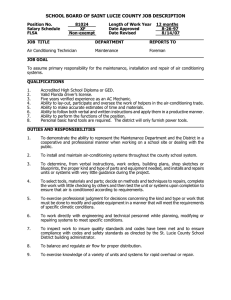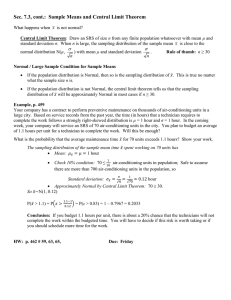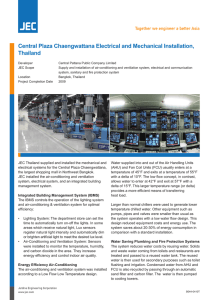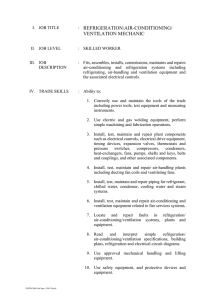Air-conditioning Facilities in the Preparation Room of Laboratories
advertisement
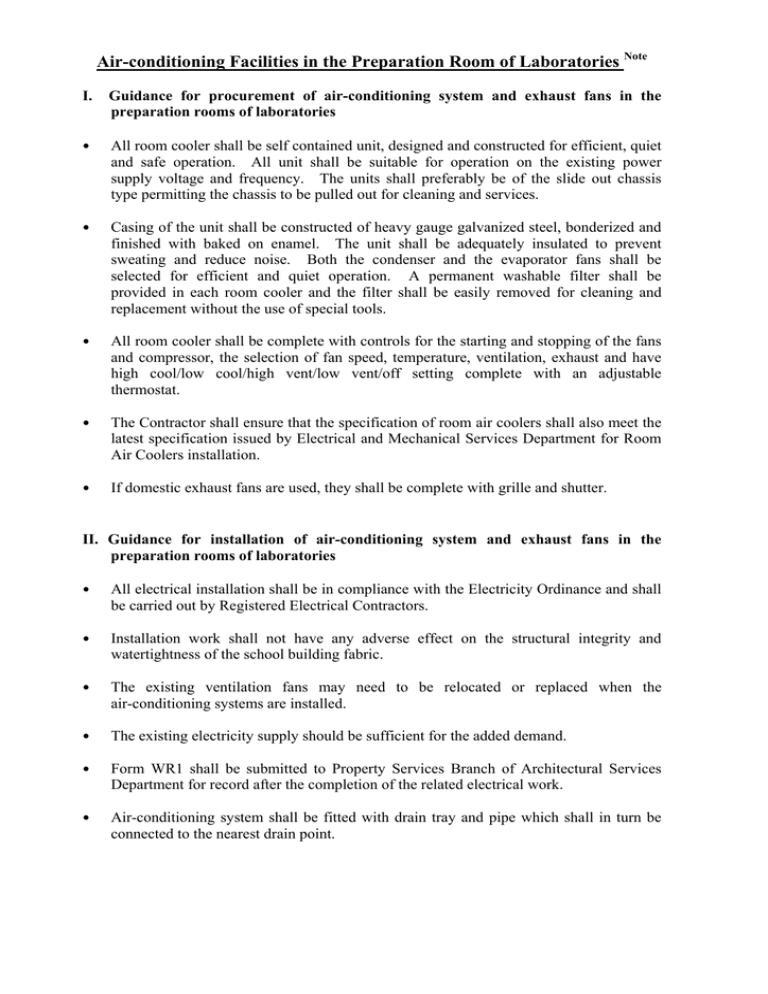
Air-conditioning Facilities in the Preparation Room of Laboratories Note I. Guidance for procurement of air-conditioning system and exhaust fans in the preparation rooms of laboratories y All room cooler shall be self contained unit, designed and constructed for efficient, quiet and safe operation. All unit shall be suitable for operation on the existing power supply voltage and frequency. The units shall preferably be of the slide out chassis type permitting the chassis to be pulled out for cleaning and services. y Casing of the unit shall be constructed of heavy gauge galvanized steel, bonderized and finished with baked on enamel. The unit shall be adequately insulated to prevent sweating and reduce noise. Both the condenser and the evaporator fans shall be selected for efficient and quiet operation. A permanent washable filter shall be provided in each room cooler and the filter shall be easily removed for cleaning and replacement without the use of special tools. y All room cooler shall be complete with controls for the starting and stopping of the fans and compressor, the selection of fan speed, temperature, ventilation, exhaust and have high cool/low cool/high vent/low vent/off setting complete with an adjustable thermostat. y The Contractor shall ensure that the specification of room air coolers shall also meet the latest specification issued by Electrical and Mechanical Services Department for Room Air Coolers installation. y If domestic exhaust fans are used, they shall be complete with grille and shutter. II. Guidance for installation of air-conditioning system and exhaust fans in the preparation rooms of laboratories y All electrical installation shall be in compliance with the Electricity Ordinance and shall be carried out by Registered Electrical Contractors. y Installation work shall not have any adverse effect on the structural integrity and watertightness of the school building fabric. y The existing ventilation fans may need to be relocated or replaced when the air-conditioning systems are installed. y The existing electricity supply should be sufficient for the added demand. y Form WR1 shall be submitted to Property Services Branch of Architectural Services Department for record after the completion of the related electrical work. y Air-conditioning system shall be fitted with drain tray and pipe which shall in turn be connected to the nearest drain point. y The air-conditioning system and exhaust fan must be electrically interlocked so that switching on of the former will automatically turn on the exhaust fan so as to avoid accumulation of gases within the preparation room, but not vice versa. (For details on the locations of the air-conditioning system and the exhaust fan, please refer to the installation layout plans for the preparation rooms of a standard design school at Annex A.) y The air-conditioning system shall be able to provide adequate ventilation with fresh air from the outside. y The exhaust air from the air-conditioning system shall be directed to the open air. y The air-conditioning system shall be an independent system exclusively serving the preparation room. y Where the other school areas are served by a central air-conditioning system, it is desirable that the air-conditioning facilities and the associated ventilating system installed for the preparation rooms should be isolated from the central system. This will avoid any spread of toxic vapours or gases to the other school areas in the event of emergencies. y Technical assistance on procurement, installation, safety measures and maintenance of air-conditioning facilities can be sought from staff of the Electrical & Mechanical Services Department as follows:1. Hong Kong Contact person : Regional Manager/General Engineering Services/Hong Kong Telephone : 2139 0700 Fax : 2577 0837 2. Kowloon Contact person : Regional Manager/General Engineering Services/Kowloon Telephone : 3155 4322 Fax : 2364 0919 3. New Territories Contact person : Regional Manager/General Engineering Services/ New Territories Telephone : 3155 4355 Fax : 2364 0919 III. Safety measures to be observed in air-conditioned preparation rooms of laboratories y The preparation rooms should be well ventilated. To maintain adequate fresh air supply, the exhaust fan must be switched on whenever the room is in use. To this effect, the air-conditioning system and exhaust fan in the preparation rooms must be electrically interlocked so that switching on of the former will automatically turn on the ventilation fan so as to avoid accumulation of gases within the preparation room, but not vice versa. y Chemicals which generate hazardous vapours should not be handled or stored inside preparation rooms, whether or not air-conditioned. Preparation work which involves unpleasant or hazardous fumes/gases should not be conducted in preparation rooms but in fume cupboards of the laboratories. y When Bunsen burners or chemicals are to be used inside the preparation room, all air-conditioning system should be switched off and exhaust fans switched on. The windows of the room should be left open. Notices to this effect should be prominently displayed in the preparation room. All users of the preparation room should be notified of the above measures. y Attention should be paid to regular cleansing of the air filter in the maintenance of air-conditioning facilities. y Education Bureau’s handbook “Safety in Science Laboratories” provides details on safe handling of corrosive/flammable/toxic/harmful chemicals in schools. Besides, the circular concerning “Safety in School Laboratories” sets out safety measures to be taken in air-conditioned special rooms including Science Laboratories. Note In 2000, an one-off cash grant and recurrent subsidy were provided to aided secondary schools for the installation/replacement of air-conditioning facilities in the preparation rooms of their laboratories. The recurrent subsidy has become one of the constituent grants under the Operating Expenses Block Grant in the 2000/01 s.y. and subsumed in the Expanded Operating Expenses Block Grant in the 2005/06 s.y.. Annex A
